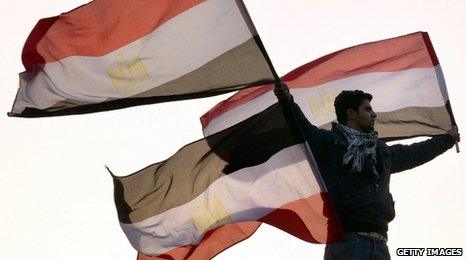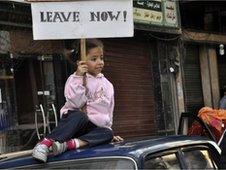Egypt's president to stand down but not until September
- Published

After days of protests Egypt's president has promised to stand down but not until elections in September.
Thousands of anti-government protesters celebrated the announcement around the country and in Cairo's Tahrir (Liberation) Square but say he should go sooner.
Hosni Mubarak announced the end of his 30-year rule during a televised address to the nation.
He said he would work during "the final months" of his term to ensure a "peaceful transfer of power".
Opposition parties had been demanding that he resign by Friday.
There have been clashes between pro and anti-Mubarak protesters creating concerns that this could be the start of a more violent crisis.
They say they won't stop unless Hosni Mubarak quits his job.
British tourists have been warned to get out of major Egyptian cities.
The Foreign Office is sending a charter plane to Egypt to allow further British nationals to leave the troubled country.
The Boeing 757, with capacity for 220 passengers, will leave from Cairo for Gatwick today (2 February).
In America, Barack Obama called for immediate action to end the crisis.
He said: "What is clear is my belief an orderly transition must be meaningful, it must be peaceful and it must begin now."
Activist Jihan, 23, told Newsbeat she was scared she'd be killed by police.
"They started shooting tear-gas and those sound-bombs," she said.
Widespread poverty
"I saw flames coming out of a gun with smoke. So I started running. Everybody was trying to hide."

Young protestor in Alexandria holds a placard calling for president to go
Activists say they've been inspired by nearby Tunisia where protests recently forced out an unpopular leader.
They've been spreading their message on sites like Facebook.
But there is evidence that the authorities have tried to clamp down on social networks to stop the activists getting organised.
Demonstrators are angry about a wide range of things from widespread poverty and rising prices, to claims of torture and government corruption.
Egypt's president, Hosni Mubarak, has ruled since 1981.
There are widespread claims of rigged elections to keep him in power and many say his son will take charge when he stands down.
Much needed
Uncertainty in Egypt is always likely to be a worry for the UK and America.

There's evidence that authorities in Egypt have tried to clamp down on social networks
It's a major shipping route through the Suez canal and the government there is a much needed ally in talks to find peace between Israel and the Palestinians.
If Hosni Mubarak is forced out, it could make the wider Middle East more volatile.
Trouble in the Middle East has a direct impact on your pocket.
We've seen the cost of crude oil top $100 a barrel lately.
That affects prices at the pump and you can put it down to this kind of uncertainty.